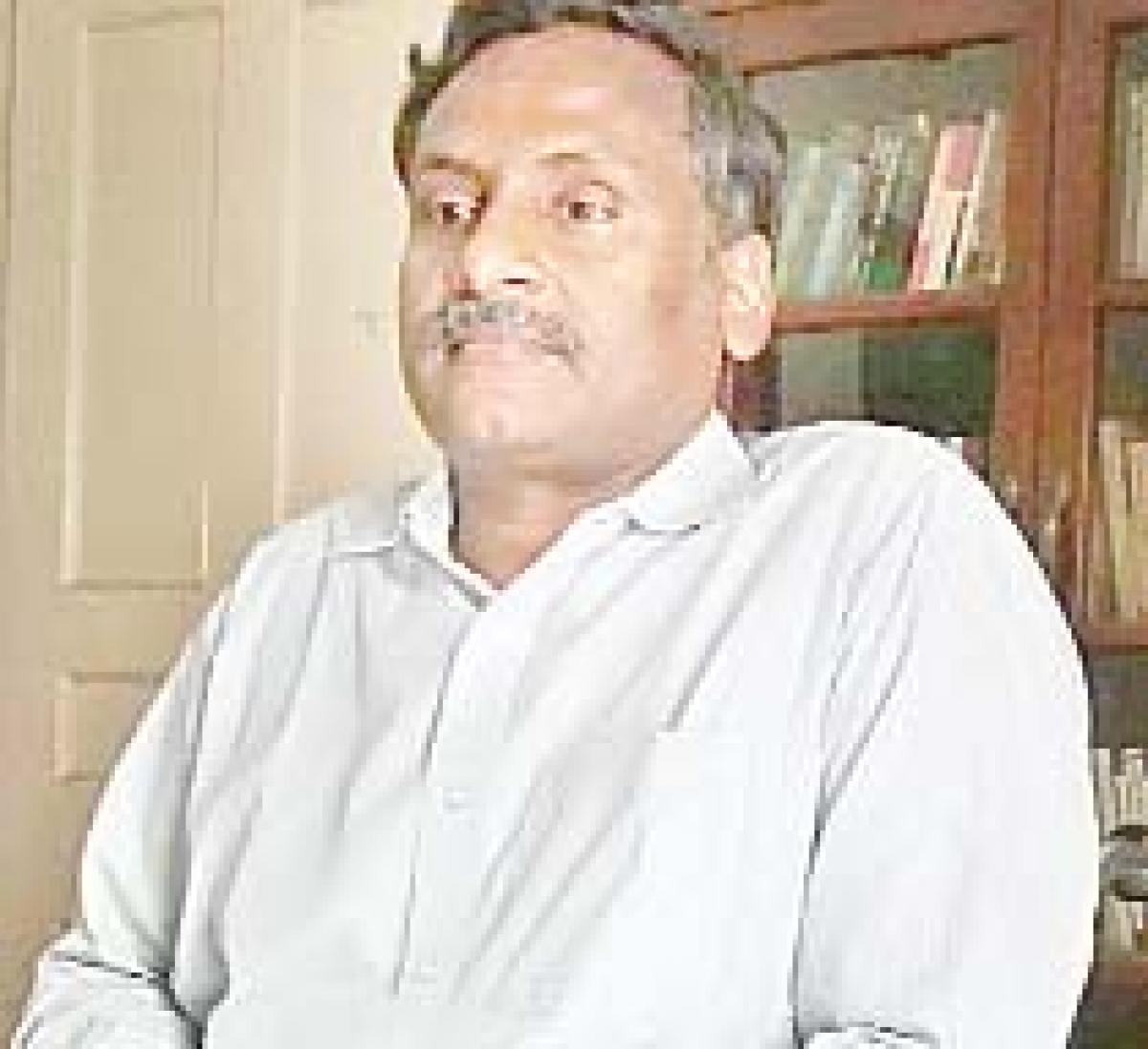Live
- Chanchalguda Jail Officials Say They Haven't Received Bail Papers Yet, Allu Arjun May Stay in Jail Tonight
- BJP leaders present evidence of illegal voters in Delhi, urge EC for swift action
- Exams will not be cancelled: BPSC chairman
- Nagesh Trophy: Karnataka, T.N win in Group A; Bihar, Rajasthan triumph in Group B
- YS Jagan condemns the arrest of Allu Arjun
- Economic and digital corridors to maritime connectivity, India and Italy building vision for future, says Italian Ambassador
- SMAT 2024: Patidar's heroics guide Madhya Pradesh to final after 13 years
- CCPA issues notices to 17 entities for violating direct selling rules
- Mamata expresses satisfaction over speedy conviction in minor girl rape-murder case
- Transparent Survey Process for Indiramma Housing Scheme Directed by District Collector
Just In

Maharashtra Govt Tried To Kill In Prison: GN Saibaba. By denying life-saving drugs in jail, the Maharashtra government tried to kill him, alleged GN Saibaba, a Delhi University English professor who has just been released on three-month\'s bail from Nagpur jail.
.jpg) New Delhi: By denying life-saving drugs in jail, the Maharashtra government tried to kill him, alleged GN Saibaba, a Delhi University English professor who has just been released on three-month's bail from Nagpur jail.
New Delhi: By denying life-saving drugs in jail, the Maharashtra government tried to kill him, alleged GN Saibaba, a Delhi University English professor who has just been released on three-month's bail from Nagpur jail.
In a two-hour long conversation with IANS at his official residence in Delhi University campus, a wheel-chair bound Saibaba said that despite being a heart patient, he wasn't given regular medication for the first seven months in prison and the authorities ignored repeated warnings by the doctors.
"After 14 months in jail, my left hand is completely paralysed due to muscle degeneration. I have developed a severe heart condition and breathlessness," he said, adding that the jail authorities had even ignored an order by the National Human Rights Commission on his alarming health condition.
His bail plea was rejected thrice in the last 14 months.
The Maharashtra Police arrested Saibaba for his alleged Maoist links in May 2014. While giving bail, the Bombay High Court had taken suo moto cognisance of a news report on his health and a letter by activist Purnima Upadhyay.
The court observed that Saibaba's life could be in danger if he was not released for medical treatment.
Despite being a 90 percent physically challenged person, he was kept alone in a cell, which lacked a western commode and a bed, Saibaba said. "In the first three days in the prison, I was sitting in my wheel-chair without food. It is after the prisoners protested that I was offered help. Someone needs to hold me to go down to the toilet. Later, I was provided with an iron bed, which was not disabled-friendly at all," lamented Saibaba.
The high-security 'anda' (egg-shaped) cell, where Saibaba was kept is meant for terrorists and Maoists. Describing conditions at the prison, Saibaba said that flagrant human rights violations happen there and it's worse than the notorious Abu Ghraib prison. He added that jails are safe havens for high-profile criminals.
"Though I was not subjected to physical torture, I have seen prisoners being tortured in front of my eyes. High-profile gangsters collude with jail authorities and are given special treatment," he added.
Fourteen months in jail taught him the value of freedom of expression, Saibababa said. "I still feel like I am in prison. My voice was muffled for 14 months. I wasn't allowed to talk freely to my family. Everything took a toll on my health," he said.
He also missed his students and classes a lot during this time, he added. "I used to teach the prisoners English whenever I got time," he said. He also deplored the way he was arrested without a warrant.
"I was intercepted on my way back home from the University and my laptop was taken without being sealed in front of me," he alleged. He also denied the police claims that incriminating evidence was found from his laptop."They had found some press statements of Maoist leaders from my pen drive," he said.
Saibaba further explained that in custody, he was interrogated by the Intelligence officials mainly on the activities of his group called Forum Against War on People. He claimed that his campaigns thwarted the previous UPA government's attempts to take away land from the tribals. He also accused the previous government of entering into MoUs with multinationals for many big-ticket projects in the mineral-rich Adivasi belt.
"My arrest shows how the government is scared about our successful campaign against land grabbers in Chhattisgarh and other tribal areas. Because of our campaign, many international investors withdrew their investments. I feel that the NDA government is trying to revive the projects now," he said.
The UPA government had launched 'Operation Green Hunt' in 2009 to rid Maoist rebels from across the tribal belt of India. "I have been branded as an anti-national for asking the government to implement provisions within the Indian constitution that upholds tribal rights, isn't that very surprising?
I only want them to implement the provisions of the Fifth Schedule of our constitution," said the professor, who was arrested for alleged links with Maoists under Sections 13, 18, 20, 39 of the UAPA (Unlawful Activities (Prevention) Act.
The authorities claimed that his name came up after the arrest of two alleged Maoist sympathisers in December 2013. The police allege that Saibaba was an overground worker for the CPI-Maoist a charge that he denies.

© 2024 Hyderabad Media House Limited/The Hans India. All rights reserved. Powered by hocalwire.com







